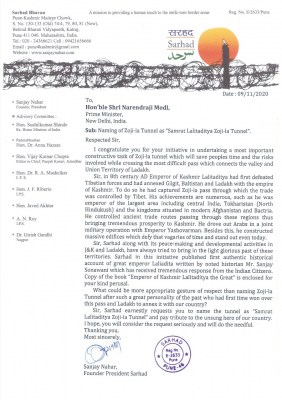

 By Quaid Najmi
By Quaid Najmi
Pune, Dec 25 : Three months after work on the ambitious Zojila Tunnel started, a Pune NGO has urged that it should be named after Emperor Lalitaditya, the great eighth Century conqueror and ruler of the Ladakh region.
In letters to Prime Minister Narendra Modi and Road Transport Minister Nitin Gadkari, the NGO Sarhad has said the naming of the upcoming tunnel after Emperor Lalitaditya would be a fitting tribute, as it was he who had defeated the Tibetan forces and paved the way for annexing the Ladakh region with the then Kashmir kingdom.
Approved by the UPA government in 2013, Modi laid the foundation stone in May 2018, while in October 2020, Gadkari initiated the ‘first blast’ for the proposed all-weather tunnel, which will be 14.20 kms long, four-lane single-tube tunnel, linking Baltal with Minamarg.
It is considered to be among the most important projects like the Atal Tunnel (9.02 kms) at Rohtang Pass in Himachal Pradesh, inaugurated by Modi on October 3, and the Dr. S.P. Mookerjee Tunnel (9.30 kms) on the Jammu-Srinagar NH44.
Scheduled for completion around 2025, the Zojila Tunnel will permit round-the-year connectivity with the strategically important regions of Kargil and Drass — which ranks as the second coldest inhabited place (population 15,500) on Earth after Russia’s Oymyakon.
Situated at a height of 3,528 metres (11,575 feet), currently Zojila Pass can be crossed in around 3-4 hours’ drive, but remains cut off from the Kashmir Valley for 6-8 months due to heavy snowfall and avalanches.
“The people of Ladakh and Kashmir are also supporting this demand to christen it as ‘Samrat Lalitaditya Zojila Tunnel’ in his memory,” Sarhad founder-president Sanjay Nahar told IANS.
He said that in the 8th Century AD, Emperor Lalitaditya was the first to defeat the advancing Tibetan forces, and then he also helped annex Ladakh, as well as the Gilgit-Baltistan kingdoms, the latter currently administered by Pakistan.
“Over 12 centuries ago, Emperor Lalitaditya had realized the strategic importance of Zojila Pass, through which Tibet controlled its flourishing trade with other countries. Emperor Lalitaditya struck by capturing the extremely critical mountain Pass,” said Nahar, citing historical aspects of the great ruler.
During his reign (724-760 AD), Emperor Lalitaditya built a huge empire encompassing vast tracts of central and southern India, Tokharistan or North Hindukush, the kingdoms in modern-day Afghanistan, Uzbekistan, Tajikistan and Bactria in Central Asia.
“He also drove out Arab invaders in a joint military operation with Kannauj Emperor Yashovarman of the Varman Dynasty, and also controlled many of the ancient trade routes linking Asia with Africa and Europe, which brought immense prosperity to Kashmir and his empire,” said Nahar.
In the new ‘tunnel avatar’ of its modern existence, it is expected that tourists from India and world over would be lured round-the-year, and affluence would return to this starkly cold but immensely beautiful and unexplored region of Kashmir.
(Quaid Najmi can be contacted at q.najmi@ians.in)
Disclaimer: This story is auto-generated from IANS service.

